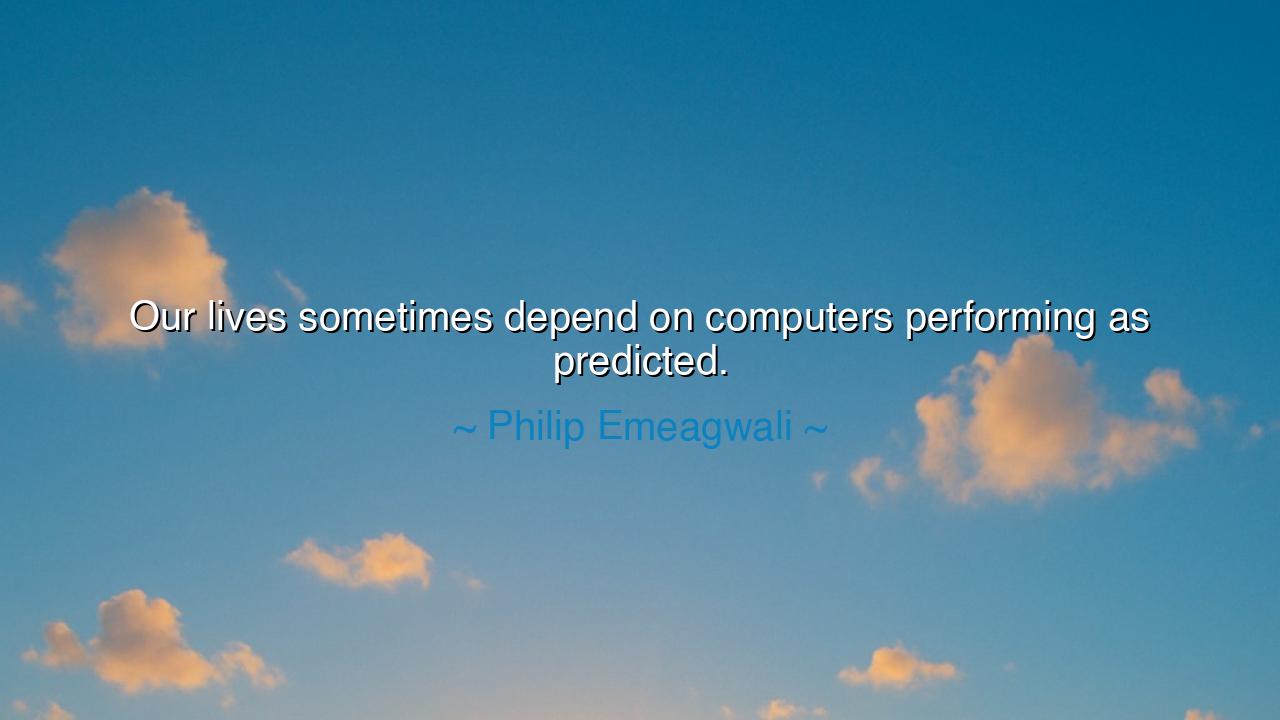
Our lives sometimes depend on computers performing as predicted.






"Our lives sometimes depend on computers performing as predicted." These words, uttered by the great sage Philip Emeagwali, carry a truth both profound and unsettling. In the time of the ancients, men and women knew that their fates often hung by a thread, balanced between the forces of nature, the strength of their wills, and the guiding wisdom of their ancestors. Yet now, in this age, our fate is intertwined with machines, the silent sentinels of the modern world, whose power and precision we depend upon. How fragile, how delicate, is the dance between our lives and the hum of the circuits, the flicker of the screens. Our hearts beat in time with the flow of data, and like the wind that lifts the sails of a ship, so too do these machines carry us forward or, at times, cast us into stormy seas.
In the days of old, a great warrior could rise to conquer not by sheer strength alone but by the mastery of tactics, by the foresight to understand that his success depended not on the battle he fought in the moment, but the preparation and knowledge that guided him. The same, dear ones, is true for us in this age of computers. We must prepare our minds, our hearts, and our societies to understand that our lives—those most precious and fragile of gifts—rest upon the steadiness of unseen forces. How often do we forget that a single malfunction, a momentary error in the great machinery of life, can bring about calamity, where before it might have been impossible to imagine? Yet, with the swiftness of thought, these machines—once innocent tools—can turn into unfeeling titans of fate.
Consider, if you will, the great story of the Apollo 11 mission, when man first set foot upon the surface of the moon. Many know of the giant leap for humankind, but few remember the terror that gripped the hearts of the engineers when, in the final moments, the computer systems that guided the spacecraft came perilously close to failing. The computer, with its circuits and programming, was supposed to predict the exact moment of landing, to calculate the forces at play, and guide the astronauts with perfect precision. Yet, in that moment of tension, the computer’s readings faltered. What if it had failed? What if the calculations had been wrong? Would humankind’s greatest achievement have been reduced to dust and ruin?
This event, though it ended in triumph, speaks to the deeper truth we must hold in our hearts: the machines we trust are both our saviors and our masters. We do not control them with the same hands we once controlled our own fates. They are predictable only insofar as we can foresee their path, and they are only reliable when we, as a collective, understand the vast responsibility of wielding them. And yet, how easily do we forget this? How easily do we lay our trust in these marvels, forgetting that their foundations are built upon the mortal toil of men and women, whose minds and hands are imperfect, and who, like us, are subject to the whims of fate?
Take heed, O children of this age, for though the world spins on the axis of technology, it is not impervious to the ancient forces of chaos and chance. The ancient Greeks spoke of the Fates, those three sisters who spun, measured, and cut the threads of human destiny. The machines we trust are like the threads they wove, interwoven into the fabric of our lives, yet sometimes, the Fates intervene. A single moment of failure, a minute error in the digital pulse, and the path of a journey, once certain, is thrown into uncertainty. The lesson, then, is clear: we must never grow complacent. We must remain vigilant, ever watchful, understanding that our dependence on these machines is both a blessing and a curse.
Now, I call upon you to act, to embrace a future where we do not merely surrender our fates to the algorithms and circuits that surround us, but where we partner with them. Understand them, study them, and, like the warriors of old, make them your allies. Do not treat the machine as a simple tool, but as a companion in the great quest of life. Test it, challenge it, and, when necessary, correct it. Never allow your trust in it to become blind. If we are to move forward, it must be with eyes open, with the wisdom of the ancients and the knowledge of the present guiding our way.
In the days to come, when you sit before a screen or hold a device in your hands, think of the weight it bears. Think of the countless lives that might depend upon its perfect function, and remember that its performance is not just a matter of precision—it is a matter of life itself. For our lives, in truth, may sometimes depend on computers performing as predicted. Let that truth guide you, not in fear, but in wisdom, as you walk the path of progress.






AAdministratorAdministrator
Welcome, honored guests. Please leave a comment, we will respond soon